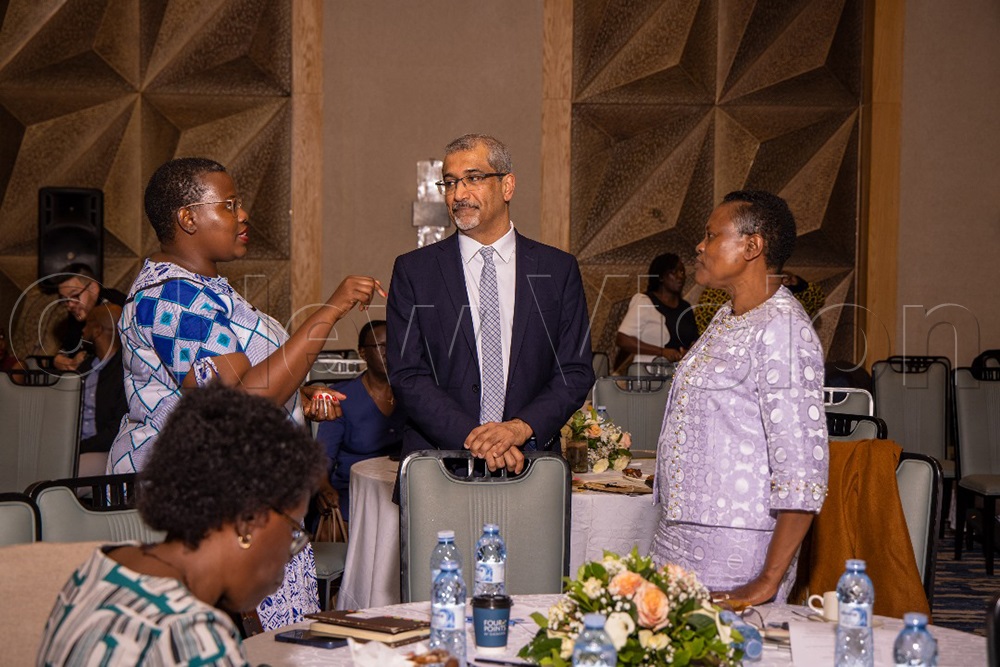Ugandans challenged to lead drive for self-reliance, innovation roots
The Annual Scientific Conference organised by the Uganda National Academy of Sciences (UNAS) examined how Uganda can harness its cultural heritage, scientific knowledge and human capital to sustain growth and reduce dependency on external support.
Rugunda, Musenero presenting awards to some of UNAS members for their unwavering service. (Credit: Richard Ategeka)
__________________
Leaders and scientists have challenged Ugandans to embrace a new era of self-reliance and self-sufficiency, grounded in its culture, as the country prepares for a future less dependent on foreign aid.
Former Prime Minister and Special Envoy in the Office of the President, Ruhakana Rugunda, says the reduction in foreign aid should be seen as a wake-up call for national ownership and renewal from within.
“Self-reliance and self-sufficiency mean dignified independence in a globalising world,” he says.
“It does not mean isolation, it means defining our priorities and patterns in our own terms, engaging the world with confidence, not dependence.”
Rugunda was launching the Consensus Study Report titled: Renewal From Our Roots: Uganda’s Journey to Self-Reliance and Self-Sufficiency at Four Points by Sheraton in Kampala, October 31, 2025.
The Annual Scientific Conference organised by the Uganda National Academy of Sciences (UNAS) examined how Uganda can harness its cultural heritage, scientific knowledge and human capital to sustain growth and reduce dependency on external support.
He praised UNAS for its role in promoting evidence-based decision-making and recalled Uganda’s progress in health policy during his time as Minister of Health.
“When government trusts and empowers its scientists, transformation happens. Science clarifies, politics decides, and leadership bridges that.”
He also urged ministries, universities and communities to integrate the report’s insights into their work: “Transformation begins with mind-set. Let ministries integrate these insights into planning, let universities teach them, and let communities lead them.”
Guests interacting at the event. (Credit: Richard Ategeka)
Powerful tools for transformation
In a message delivered by Monica Musenero, the Minister of Science, Technology and Innovation, Vice-President Jessica Alupo lauded UNAS for steering a national conversation that connects science, culture and development.
“True progress begins from what we remember, our values and our collective capacity to build. Self-reliance is not isolation, and self-sufficiency is not withdrawal. They are expressions of dignity and confidence rooted in our ability to speak for ourselves, utilise our resources, and innovate for our nation.”
She reaffirmed the Government’s support for innovation and research, noting that science and technology, when grounded in ethics and culture, are powerful tools for transformation.
“Our ministry stands ready to work with the Academy and all partners to translate these insights into tangible outcomes,” she said.
“Together, we can build a Uganda that generates knowledge and draws strength from its cultural roots.”
Musenero, in her own remarks, urged scientists to move beyond research papers and conferences to practical solutions that serve communities.
“The time is now for scientists to take your position,” she said. “We are perfect in our presentations, but we are hopeless in implementation because we lack confidence.”
She called on Uganda’s researchers to rediscover indigenous ingenuity, citing early iron smelting and tool-making as evidence that innovation has always been part of the country’s DNA.
“We must walk through our cultural roots with confidence; that is where true innovation begins,” she said.
Declining foreign aid
Dorothy Mutheu Ngila, a member of the study committee, said the research was motivated by the reality of declining foreign aid across Africa, compelling Uganda and the continent to explore new pathways of self-reliance.
“External funding is dwindling, not just for Uganda but for the continent,” she said.
“Yet when aid declined, the country did not collapse. Instead, traditional systems of cooperation re-emerged, showing that resilience we need already exists within us.”
She said the study found that Uganda possesses the cultural, social, and intellectual assets necessary to build a self-sustaining economy.
“Our culture, institutions and identity are resources in themselves,” she explained.
“There are different ways of knowing and doing, and Uganda must harness all of them to shape its own developmental trajectory.”
On how the report can avoid being shelved like many studies, Ngila said the research team was deliberate in identifying who would use the findings, including the government, institutions, and individual citizens who should see themselves in the story of self-reliance.
She added that self-reliance strengthens, rather than weakens, global partnerships, allowing countries to engage globally from a position of dignity, not dependency.
“The individual is the most important catalyst in Uganda’s development journey,” she noted. “Once we shift our mindsets, everything else follows.”
Rooting science in communities
Grace B. Kyomuhendo, UNAS President, said the conference theme is a reminder that national transformation begins with looking inward.
“The importance of this theme lies in our country looking inwards rather than outwards,” she said. “We must identify the resources we have, the opportunities to build our own capacities, and rely on ourselves in multiple fields.”
Kyomuhendo called for deeper integration between research and policy, emphasising that Uganda has enough resources to drive its own progress.
“The biggest gap in our development has been that research has stood alone while policy has not been driven by science,” she said.
“This study gives us a roadmap for connecting individuals to institutions and creating a system that works together for a better country.”
“If we draw from our cultural heritage and build relationships from the grassroots, Uganda will not be left behind.”